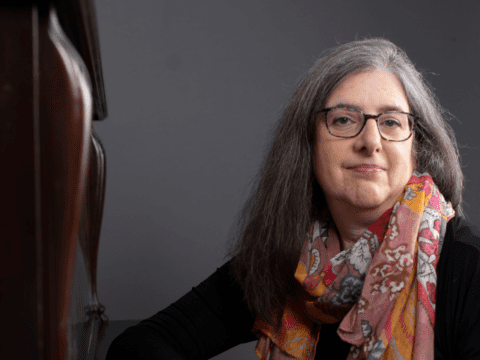During my first year of ministry school, I was consumed by the “God question” that I would be asked during my commissioning service after graduation. “Do you believe in God: Father, Son, and Holy Spirit, and do you commit yourself anew to God?” I did research assignments about it, I reflected, I scribbled in my journal. Teary-eyed, I quizzed ministers about it. I feel called to ministry, so why does it scare me? And what does the question really mean? This deeply matters to me, so much that it is one of the reasons I decided to take a break from diaconal ministry school.
In the United Church, ministry candidates are assessed for “promise, suitability and readiness” throughout their training by the Candidacy Board. In a final interview, this board “must satisfy itself that … the candidate is in essential agreement with the statement of doctrine of the United Church.” Essential agreement is not defined anywhere in the Manual, which contains both the church’s Basis of Union and its bylaws, but tradition holds that it means clergy do not need a literal adherence to the church’s doctrine. Finally, in a public worship service, candidates becoming ministers publicly profess their faith. Many words for God can be used in the liturgy — but the ritual must include the God question just as it has been worded since 1972.
You may unsubscribe from any of our newsletters at any time.
That means that anyone wanting to become a minister has to say “yes” to the Trinitarian framing. Church members do not have to adhere to a particular creed or doctrine. Many think the same is true for candidates, but the flexibility enshrined by our tradition of “essential agreement” applies to the Candidacy Board’s decision, not the questions asked in the public service — in that rite, your options are either yes or no.
This question has been on a lot of people’s minds recently, since everyone in the church seems to have an opinion about atheist minister Rev. Gretta Vosper. In 2016, she was re-asked the God question and others to measure her suitability as a minister in the United Church. Although after three years of wrangling Vosper was ultimately allowed to continue her ministry, I wonder about other ministers who may now worry if they too could be re-asked whether they believe in God. Rev. Jenny Stephens, Office of Vocation co-ordinator, confirmed in an email that in a review of the effectiveness of ministry personnel, “the reviewer may ask the minister questions related to beliefs” — and the initial concerns could potentially be theological.
I wish there was a way I could honour my experience of spirituality in the public commissioning ceremony, not just in private meetings.
Some are scrutinizing the words “Father, Son, and Holy Spirit” in the question itself. At General Council 43 last summer, Saskatchewan Conference supported a proposal brought forward by Wascana Presbytery to change the terms, offering “Holy Mystery” as an example of language that could be used instead. The proposal said the current phrasing “creates a crisis of conscience for many candidates.”
For me, “crisis” accurately describes how the Trinitarian phrasing makes me feel. If I honour other faiths, I cannot say God is limited to these three images, nor do I believe God is a literal deity. Plus, it was United Church theology itself that taught me God is not just “Father” but also “Mother,” and countless other metaphors.
One minister assured me that everyone in his graduating class had concerns about the wording, but they just answered “yes” to the question and then expanded on their answers privately in their heads. This made me feel uneasy. I think “Holy Mystery” might work for me, but the proposal did not go through. (Although, the 14-member theology and inter-church inter-faith committee was asked to “engage in a study on modernizing the theological language we use for the agreements.” I am curious about what they’ll find.)
Others feel deeply connected to the words as they are and do not want to change them. Mitchell Anderson, a ministry candidate from the Dënesułiné Nation who will be ordained this summer in Saskatoon, says, “the Trinity is at the very heart of my faith and at the heart of our faith.” He has heard the Trinitarian position described as “backwards” and “out-dated” — a framing that he finds hurtful. “It creates camps that divide and that try to position some people as enlightened and other people as ignorant.” He hopes that if the question changes, decision-makers will choose to add words rather than take them away.

And not everyone sees the preferential positioning of “Father” as a problem. Ordained in 2018, Rev. Ingrid Brown of Courtenay, B.C., knows that Father can be read as patriarchal, but says that using the word “was a wild, radical feminist statement.” For a woman in ancient Israel to claim God as lord and father over her patriarch was “a complete subversion of authority.” Brown does not want to lose this history, or our international partnerships.
Clearly, ecumenism is core to the United Church. The denomination was formed by uniting together. For Brown, Anderson and others, these are crucial relationships and the crux of why the church needs to maintain Trinitarian language. They say these words connect all Christians globally, and also join us through time to our Christian ancestors.
But if the United Church changed them, would it really lose its place in bodies like the World Council of Churches? In a word, “no,” says Bill Wall, a former United Church minister who put himself on the discontinued service list to protest what he sees as a shift in the church toward a more conservative theology. Wall reminds me of other times the United Church was on dicey ground with our ecumenical partners yet ultimately remained in the fold, like when it welcomed women and then LGBTQ2 people into ministry. In fact, no one has ever been asked to leave the WCC, and the United Church would be in good company even without the Trinitarian wording — the Society of Friends (Quakers) are part of the council and have no creeds whatsoever.
For me, what it all comes down to is this: are the terms used for God meant to be taken literally? I called Rev. John H. Young, the General Council’s executive minister, theological leadership, to ask. His own personal answer was that Father, Son and Holy Spirit “are all metaphorical.” So, case closed, we just make up our own definitions? Not so fast. “No term we use for God fully encompasses — is able to encompass — who God is,” he adds. “Our knowledge of God is via our tradition; our knowledge of God is always partial.”
More to read: Gretta Vosper settlement could redefine the United Church
So what’s a candidate to do? What would I even be agreeing to? This lack of clarity also concerns Kenyo Araújo, a former Catholic Discalced Carmelite from Brazil who decided to take a break from pursuing United Church ministry after Vosper was re-asked the ordination questions. He enjoys discussing the “Do you believe in God?” question in conversation, knowing that every person has a different understanding of what it means. Yet when asked by the church in a formal service with no option for dialogue, he says, it becomes “a colonizing question,” meaning that a candidate without power is agreeing to something that the institution in power has not defined. Araújo is uneasy about agreeing to commit his life to something that does not have a definition. “They can change their expectations any time,” he says. Araújo suggests the church should “question the question. Why am I asking this? What am I really asking?”
If I were in conversation with Araújo about the God question, I would say that lately, I experience a shared creative force from my unconscious that leads me toward wholeness, which may or may not be connected to a source outside me. I see ideas of God, Father, Jesus and the Holy Spirit as excellent metaphors through which many people access the concept of that which inspires. Billions of other people find the sacred through other deities and non-theistic philosophies like Buddhism.
I became a candidate for ministry while being very open about my theology in interviews. I think that means I fit within United Church theology — or do they expect my views to change through school? I wish there was a way I could honour my experience of spirituality in the public commissioning ceremony, not just in private meetings. I would love if we could return to a practice used in the Decade of the Churches in Solidarity with Women from 1988 to 1998, when United Church candidates answering the God question were able to add a statement of their own understanding. I want to be able to say what I mean.
This review first appeared in the June 2019 issue of Broadview with the title “Do you believe in God?” For more of Broadview’s award-winning content, subscribe to the magazine today.















My first response to the author: “If you are struggling with God, you are on the right track.” Many Biblical patriarchs “struggled” with God.
It seems unclear if the author is questioning God, or if they are questioning the Trinity.
First, the Bible is a remarkable book, and in spite of criticisms; it is still the bestselling book. Why?
If it is a remarkable book, do we see it as inspired and infallible? This is the defining line of one’s faith.
If we question the validity of the Bible, we question the validity of God- period.
In regards to the Trinity (a term man uses to define a “Mystery” as the author uses) the Bible is clear there is one God. But God appears as three, co-existent, co-eternal Persons. Much in the way we view man as: soul, body and spirit (Father, Son and Spirit), here I believe is where we are made in God’s image. In Genesis we see in creation “Let us…” (Who is us?) In Matthew, why are we commanded to baptize in the name of the Father, Son and Holy Spirit? (Would not saying “God” be enough?) Many verses support the application of God as three distinct Persons, yet One, a quick three are: 1 Peter 1:2; Romans 9:5 and Acts 5:3-4. Thomas called Jesus “My Lord and my God” John 20:28. Mark 13:11 implies the Holy Spirit is God when cross-referenced with Matthew 10:20.
To me, if you are questioning if there is a God, why are you going into the “Christian” ministry? Become a social worker – trust me, the pay and hours are far better.
1 Corinthians 2 and Jeremiah 9:23-24 states that God is knowable; he’s not some metaphor or guy in the sky thing.
Finally – the rubber hits the road with this question “Would I be willing to die for my belief?” I struggle with that question from time to time, but it is a true test of your faith in God, Christ and the working of the Holy Spirit.
Gary, I disagree with you when you say “the Bible is clear there is one God.” The books of the Bible name many different gods — Elohim in Genesis 1, YHWH in Genesis 2, El Shaddai, Baal, and others. The Hebrew Testament does not dispute the existence of innumerable deities, just that the descendants of Abraham are to worship one particular tribal god YHWH.
There are also at least seven different Jesus’ in the Greek Testament: the oldest portrait by Mark, Matthew’s distortion of Mark (in which Jesus several times threatens people with eternal torture in Hell), Luke’s distortion of Mark (in which Jesus’ torment in Gethsemane and on the cross is transmogrified into equanimity), John’s quite different Jesus (always talking about Himself), the Jesus of the real Paul, the [lamentable] Jesus of the fake Paul, and the insanely brutal warrior-Jesus of Revelation.
Then it should be better to say: the Bible is clear that we should worship one God (YHWH). Isaiah 43- 46. When Greek Testament authors refer these scriptures, the Greek word (Kyrios) Lord is used. We can assume Christians need to worship the same one God.
Your views of the synoptic Gospels are a bit different than mine, but we have three distinct views of the same events regardless of sources. John had a unique view of Christ’s ministries, but it doesn’t disqualify the authenticity. I am very confused as to who “fake” Paul is. Googling, I’ll assume you mean the Pastoral epistles, which could easily be argued as Pauline. Summing up, the writers all refer, somewhere in their writings, that Christ was the Son of God.
“If I honour other faiths, I cannot say God is limited to these three [Trinitarian] images.” Affirming the Christian and Trinitarian faith does not mean you dishonor other faith. Just like Jews referring to God as “JHWH” and Muslims “Allah” does not dishonor Christianity and the other faiths. But these different ways we refer to God – point to our Christian understanding of God. While respectful – it is nonetheless different – and those differences matter. Ignoring Trinitarian language out of political correctness or a desire to be “inclusive” or “woke” will not make these differences go away. I am glad you found another job – Christian ministry is not for you.
If the U.C. would return to recognizing the Holy Bible as THE Word of God as opposed to CONTAINING the word of God, accepting that EVERY word contained in it is “God breathed (inspired by God), and is useful to teach us what is true (doctrine), for reproof, for correction, and for instruction in righteousness, – it would answer all your questions and transform the church.
A well written and excellent piece of research on the vows for diaconal and ordained. I know that times have changed and I was shocked after all the work we did in the 70’s re language that Father Son and Holy Spirit were back on the roster. My ordination it was creator redeemer and sustainer. No one got upset and I heard other metaphors. It was a time of change and never did a baptism using the patriarchal script. I felt like a stranger at my retirement. I was no detached uninvolved minister until I went into Counselling. In fact I created a number of youth resources. Maybe someone should have checked the theology. I was on the World Council Of Churches and always proud of our progressive positions. How we made them think. Now survival seems to dictate retrenchment. I think it is the wrong way to go. This spells certain death. As an old timer that’s what I think.
Sometimes we want to use/ translate a phrase that makes things sound nicer, but it obscures the original meaning. Take the word “nice”. It is a term derived from the Latin word nescius meaning ignorant. Again, the word awful, meaning full of awe.
Using metaphors create a further issue with understanding the original intent of another language. How often do we read of manufacturers today using “brand” names – which in another language, makes us giggle.
The Greek word Patros used in the New Testament is means Father/father. If not, Acts 16:1 does not make sense.
Huiou means Son/son. If not, Matthew 23:35 does not make sense.
Pneumatos means Spirit/spirit. If not, Hebrews 4:12 does not make sense either.
Being proud of progress isn’t always a good thing. Have you noted the cost of your progress since the 70’s? Check your membership numbers and church closing. Have you taken the step back since moving two forward and asked yourself “Am I right? Do I need to rethink this through?” Severing a gangrenous limb will save a life not lose it.
As an old timer, that’s what I think.
Sometimes we want to use/ translate a phrase that makes things sound nicer, but it obscures the original meaning. Take the word “nice”. It is a term derived from the Latin word nescius meaning ignorant. Again, the word awful, meaning “full of awe”.
Using metaphors create a further issue with understanding the original intent of another language. How often do we read of manufacturers today using “brand” names – which in another language, makes us giggle?
The Greek word Patros used in the New Testament is means Father/father. If not, Acts 16:1 does not make sense.
Huiou means Son/son. If not, Matthew 23:35 does not make sense.
Pneumatos means Spirit/spirit. If not, Hebrews 4:12 does not make sense either.
Being proud of progress isn’t always a good thing. Have you noted the cost of the so called progress since the 70’s? Check your membership numbers and church closing. Have you taken the step back since moving two forward and asked yourself “Am I right? Do I need to rethink this through?” Severing a gangrenous limb will save a life not lose it.
As an old timer, that’s what I think.
Thank you for your comment. It certainly caused me to stop and think and jot this reply. First did i read you correctly when you said you dont use the agreed to baptismal statement because you dont agree with it. I understood that the UCC agreed to that statement with all its ecumenical partners including the Roman Catholics. I think its a matter of respect, personal leadership and denominational integrity to use the agreed language. Leaders dont always get their way. That leads me into deeoer water.
Ordained leaders dont get to proclaim their personal opinions about God from the pulpit. The pews could be filled with atheists or deists or seekers or humanists or secularists but not our pulpits. I expect my ordained leader to proclaim the story of Gods ever present love in Christ cruxified and resurrected and alive with us in the Holy Spirit. This God is drawing us into personal relationship. This God is personal. This God challenges me to love my neighbour and promises me everlasting life. It does not matter that anyone else believes in this God. But I do expect my ordained leader to trust in this God. And because my ordained leader understands its Christs community. The Church eadership fails Congregations if this is not made clear to everyone inquiring about ordination.
And for those who might not know it including the author of this article cause in the UCC the Congrgation has final say as to whom they would choose for their Shepherd. When a minister is being interviewd by a Congregation. That Congregation has the authority to ask this question and related ones of its minister. Do you believe in God. If they hear no, If they hear well it depends on what you mean by God, the Congregation can say thank you but you are not called to ministry among us.
Well expressed quest , Allison.
While I cannot define “God.” I have no doubt that God has worked and is working in my life. However, I have left the church definitions of God behind in my quest for better understanding. Two books have helped me along the path: Who Is This King of Glory? and Shadow of the Third Century, both by Alvin Boyd Kuhn.
The Bible is not A book but a collection of disparate writings by many authors in different times and circumstances, each with a different agenda in a time when they were trying to make sense of the world in which there was no science and life was cruel. It is metaphor, allegory, poetry, narrative, fable and all the other literary forms that one must sift through in order to find some value. As a Christian I do not say such things as “the Bible says…” I simply say, “this is what Jesus teaches.” However, I recognize that my way is simply one way of hundreds if not thousands of spiritual paths. My job as a minister was to provide emotional support, education, discussion and to let the loving, caring, giving, compassionate spirit of God flow through me to others. To do that I don’t have to believe what someone or some organization says I should believe. I give myself to a higher authority than a human made religious organization. I believe I was called by God to ministry and it is my faith in God, that enabled me to walk that path. Humans often diminish God by trying to define that which cannot be defined. Can we not just offer ourselves to God without any preconditions and trust that God works through us? It seems much more simple to me. And for me, it works.
Nicely done article. Of course it is all old history that has become metaphorical. I’d love to see the practice you describe at the end of the article revisited. Sounds great.
Allison has written an excellent and honest description of a key dilemma facing the church today. I remember facing a similar question in a Conference Board interview. As I struggled to be honest in my response, one of the members finally said, “It’s okay. We all feel the same way.” This process appears to want candidates to lie on this question if their views do not conform to traditional understandings. Holy Mystery would be a much more open and honest wording embracing the fact that the United Church is a knowingly inclusive community in every sense of the word.
“Be still and know that I am God”
It is a struggle for every person who returns to God.
The Good News is that we are dust and God is the only ‘Other’ to be sought afraid.
Blessing Alison on your search for the ‘Other’.
I do not believe in a ‘person or physical God’ – I do believe there is a spiritual force that moves through and around the universe. – – I no longer pray to a God; however, I sometime talk to what I consider is the ‘Universal Spirit’. – – It is also my opinion that prayer as such is really only helpful for the prayee.
Yup. Well said.
In regard to this question, unequivocally I believe in God, the Father and His many wives, as the spiritual mothers of humanity. I believe in Jesus, God’s son in flesh that lived like us and truly I mean “like us”, which nothing is mentioned in the “books” (may be because it is too common). I believe in the Holy Spirit or Ghost, that is the spiritual communicator between God and us. Lastly and not the least I do not believe that the Bible is the “Holy Book of God”. To me it is a book about God, as a historical reference of the deity. I have read it Four times in the English version and once in the Spanish version, and I can testify without a doubt, that it is not the word of God, period! Do I believe in churches? the answer is simple….Not! but I chose to attend one that it has a great sense of community and volunteerying and that to me make me feel good and it’s enough, as the other part of it I live it inside me and at home, so I do not need a building to worship that. Thank you!
Again a none issue. Since there are many theologies, trinitarian being one, but not one I embrace, to panentheist to open/ relational explore what is meant by the nature of God as ways to deal with the theological issue about the nature of God All of these offer alternatives to classical theism and to the,plastic phrase holy mystery.
The struggle about the meaning of faith is crucial
Again these alternatives are not explored leaving us with a very shallow discussion on the nature of God
By the way I find holy mystery is really a default for traditional theism. It appears as if one has a metaphor for belief in God without any deconstruction or reconstruction. It has an appeal to those who are happy with such ideas as the universe is directing us to harmony. Again the default of this view is a God who controls life and has a plan. We need a stronger metaphor that accepts the randomness of life, yet can see a lure to beauty without controlling the outcome.
I assume the Observer’s evolution into Broadview is a sign that you get it that the future will be profoundly different; that doing a better job of inherited work will no cut it in the 21st Century. If so, all good so far.
If so, it is time you stopped talking about ‘belief’, ‘beliefs’ and ‘believing’ as if some form of intellectual assent to propositions is still the core of Christianity. This view is so yesterday. Still dominant in our Modern culture, but outdated. This is well-ploughed ground. You need no longer pretend that acceptance of propositional beliefs is the core of a faithful life. It is not.
The questions that will define the 21st Century are something like these: “When push comes to shove, are you open to experiencing love, grace, beauty and forgiveness as the defining characteristics of reality and of an authentic human life? Are you willing to bet your life on such sacred experiences and to wrestle with the implications for how we should then live?”
Funny millions still die for the Christian faith that you so call “out dated”. And still many more become believers of Christ as well. Doesn’t seem out dated to them. In fact, it’s real and relevant.
I’m sure that many withing the United Church and beyond it will appreciate the integrity, clarity of mind, and yes, the humility of Alison Starks. She has attacked no one and yet she will be attacked by people who feel threatened by her willingness to ask vital questions and by her clear challenge to the United Church to remain true to its tradition of encouraging, not just allowing, progressive thought. I hope she decides to become a candidate for the ministry of the UC and I hope we as a Church have the courage and the grace to welcome her and others like her. But I caution her to test the winds before she leaps. The next report from the Theology and Inter-Church Inter-Faith Committee, the one that deals with the challenge to modernize the language of the questions put to candidates, will give us some indication of the chances progressive candidates have of declaring their faith while maintaining their personal integrity. I sincerely hope we don’t blow it.
No, I do not “believe” in God. Rather, I experience God.
How can you experience something you don’t believe in. Sounds psychotic when you think about it.
You could say the same for things you believe but can not demonstrate.
True. But the things I believe, I can demonstrate. But you can refuse to believe what I can demonstrate.
From your earlier posts I assume you mean to demonstrate the validity of the things you believe by reference to the Bible, which you have said you believe to be “inspired and infallible”. But this too is a belief and one belief does not validate another belief. You can believe in either or both but this does not constitute a demonstration of validity.
Gary, if you could demonstrate it, you’d be the best prophet in history with millions at your feet. Instead, you comment on a magazine’s website. Demonstration does not require belief – it requires observation. The world has been waiting for a Christian (or any religious person) to demonstrate the validity of their faith for thousands of years. We’re tired of waiting. Your inability to convince us is not our shortcoming.
And when we experience God, belief is no longer a requirement, neither are texts and dogma, we have all the proof we require.
What if those who “experience God” are simply experiencing what they want to experience? Because that’s how it appears. Some will speak in tongues or flop about on the floor like a fish as they “experience God”. Mass delusion is a thing.
For those of us who do not believe, and have never “experienced God” in any way, what then? Are we supposed to simply take your word for it, when from our perspective this looks more like an elaborate hoax? I don’t have the option to believe even if I wanted to.
And then you wonder why we have so few new candidates for ministry, or for confirmation for that matter. Being dogmatic about dogma never works and just makes people shake their heads and walk away.
As to how to refer to God, God is ineffable and can’t be understood or described, but if you must (especially if you think the Bible is literal) then refer to Exodus 3:14 where God says call me “I AM” (because there are no words to describe God).
I am not sure that I do or do not adhere to the notions (the theology) inherent in and no doubt expounded in many tomes and essays about the Trinity. As a lay person I think of the Trinity as an “explanatory device” -probably not the best words to use – that helps me to understand the relationship(s) between God and me as well as that between me and the rest of the world. Simply put, I do not worry too much about the implications of this concept although I would prefer non-gender based words.
Perhaps the author has not yet read the paper on Essential Agreement released in April by the Theology Inter‐Church Inter‐Faith Committee of the General Council. The paper is clear that members or prospective members of the Order of Ministry do not have the luxury of defining the terms of the questions asked of them. To make it even more clear, the answer is “yes” or “no”, not “it depends”. That does not prevent a candidate from saying yes or no and adding the phrase, “As I understand God so far”.
David, every question we are asked, not just ones like the ordination question about “belief” in “God,” requires us to define the terms used in the question. This is the nature of language.
A natural language like English is one of the most important higher powers upon which all humans depend. But are words and syntax often slippery? Yes.
[Note, I used the phrase “higher power” and did not suggest that languages like English or Chinese are a deity. While all of us are dependent on various higher powers, I am sure there are no supernatural deities nor a singular Deity.]
I was able to answer “yes” to the ordination question eight years ago, but more as something that annoyed me than as something I found meaningful.
As for Essential Agreement with UCC doctrine, which an Interview Board decided was a state that described me in 2011, it was part of the process, but hardly the most edifying. At the time, I viewed the Doctrine Section of the BOU in the same way as I did Scripture — as being purely metaphorical. Except, compared to Scripture, the Doctrine section of 1908/1925 seemed radically lacking in poetry, narrative, or utility. I have never referred to the wretched thing since.
Thanks, David. You’ve just confirmed the worst fears of some of us that the trinitarian dogma is absolute and beyond question in this new version of The United Church of Canada.
“The whole problem with the world is that fools and fanatics are always so certain of themselves, and wiser people so full of doubts.”
– Bertrand Russell
Yes, the links to the new paper on essential agreement are out now:
Letter:
https://mailchi.mp/b0b1f46f1f57/171130-1039705?e=f66839014e
Paper:
https://commons.united-church.ca/Documents/Governance/General%20Council/43rd%20General%20Council%20(2018)/Updates/Essential%20Agreement,%20Final.pdf
Summary:
https://commons.united-church.ca/Documents/Governance/General%20Council/43rd%20General%20Council%20(2018)/Updates/Essential%20Agreement,%20Summary%20Statement.pdf
I think it is a very searching and respectful of others positions. I encourage her and others to continue to challenge the rest of us in the United Church to move with as much integrity as she has shared. I was ordained 65 years ago. Even then I felt constrained by the question but continued through many theologies to answer the question, Do you believe in God? Do not hesitate to keep searching. We are living in important times as we strive to live faithfully.
The idea that professing faith in a Trinitarian God is disrespectful (or “not-honoring”) of other faiths is naive and simplistic. It is not – just like Jews calling God YHWH or Muslims “Allah” is not disrespectful to the other two religions. But in the process of ordination you are asked if you can view God through these historical (dating far back than 1972!) terms (you can use other metaphors too – but these are bedrocks for us – just like YHWH is for Jews and Allah for Muslims). If, in the process, you discerned that you cannot – then the process worked well.
An interesting article. I just hope that we don’t overanalyse the God question to death. Personally, I believe in God because I love God. Nowhere in the article is the love of God and the love for God even mentioned. To me, God IS love, and not some dry intellectual concept. It is my hope that every Pastor of our United Church come to manifest the love of God for their congregations.
i am 83 years old and a u.c. member for 63years. ihave served on a few search committees for a minister and the first question asked is how did you receive the call? if you can not answer that question you are not looking in the right direction for a vocation!
I do find it difficult to understand why someone who is not in essential agreement with the United Church’s doctrines and theology would be looking to be a minister within the United Church. There are other Faith traditions that do not follow such a doctrinal basis. I am thinking of the Unitarian or Humanist Churches for instance, of which I was previously a member. I still wrestle with questions of God myself, but I am not seeking to be a minister. I want a minister who can help calm my times of doubt, who can reassure me when facing the death of loved ones that there is a heaven, there is a God who is looking on Earth and caring for it and its inhabitants. As a liberal Christian, I left the Unitarian Church to come to the United Church. I very much respect the Unitarian Church, but I found it too undefined for myself. I find it very confusing now to read that so many people within the ministry are themselves having difficulty with the notion of God. Perhaps a Christian Church is not the right place for one seeking to be a minister and yet having so many doubts themselves about God and the trinity. There are many other ways to serve people spiritually including the Unitarian or humanist church, chaplaincy work, or Social Work. I want a minister who can respect my questions but who feels grounded and secure in their faith in God and the Trinity and is able to help strengthen my faith rather than raise more doubts and questions. This is one of the main reasons I come to church. The Unitarian and humanist churches already exist. The United Church has a special role in being a Christian Church with a broad umbrella, able to minister to the liberal and the more orthodox Christian.
Thus far the only article to attract more than one response. One might wonder why that is.
Because so many in the United Church are rabid about the essential agreement requirement in the wake of the Rev. Vosper decision, and are hopping mad about her. Nothing motivates United Church members to comment here, at Facebook, or I assume to the greater church, like any mention of Rev. Vosper. Not climate change, not child welfare, not indigenous rights. If you want the attention of United Church members, just whisper her name and they will come flying at you.
So it appears that articles such as this one addressing our Christian faith, will always be of greater interest, when compared to articles in Broadview that deal with other matters.
Of course your comment is true. If you cannot nail down your faith and core beliefs, or disbelieve them, you no longer have validity to other matters pertaining to it.
Ruben Nelson focuses the underlying issue of semantics. He is correct that some forms of propositional language are dead. This is called dogma.
However there is room for doctrine which is heuristic. Doctrine is not dogma but human shaped language to explore epistemological and metaphysical issues. For example what is the nature of reality, is there enchantment? Or does our language signify a reality more than we see or are we stuck in only materialistic explorations?
Terms like belief and faith can either be about our projections, or attempts to offer semantic terms to capture reality in its fullness, and more than the dualism that is in most propositions. Sometimes dogma comes in when we reject temporary terms that we use to explore a transcend reality ( like bill wall does) or when we force what is moveable doctrine into absolute statements.
If we deconstruct most of the statements posted here they become propositional. For they claim epistemological truth. Also they are examples of the modern turn to relativism, “my truth” as truth. Yes it is crucial to speak of experience as a touchstone, however that experience is always coded in some pair of glasses and we think our glasses give us reality rather than a way speaking. Pragmatism is one way to answer the propositional problem, assessing the truth of the meaning of theories or beliefs in terms of the success of their practical application.
In the end the success of any theory or belief system is how well they answer prior questions and give us better questions. A successful answer opens or is a ground for more explorations. Dogma shuts it down. By that it can be a dogmatic statement of rejection of past heuristic answers, Rather then old ideas open the space for more transformational ideas while making the old ideas dead
maybe you are not called to be ordained?